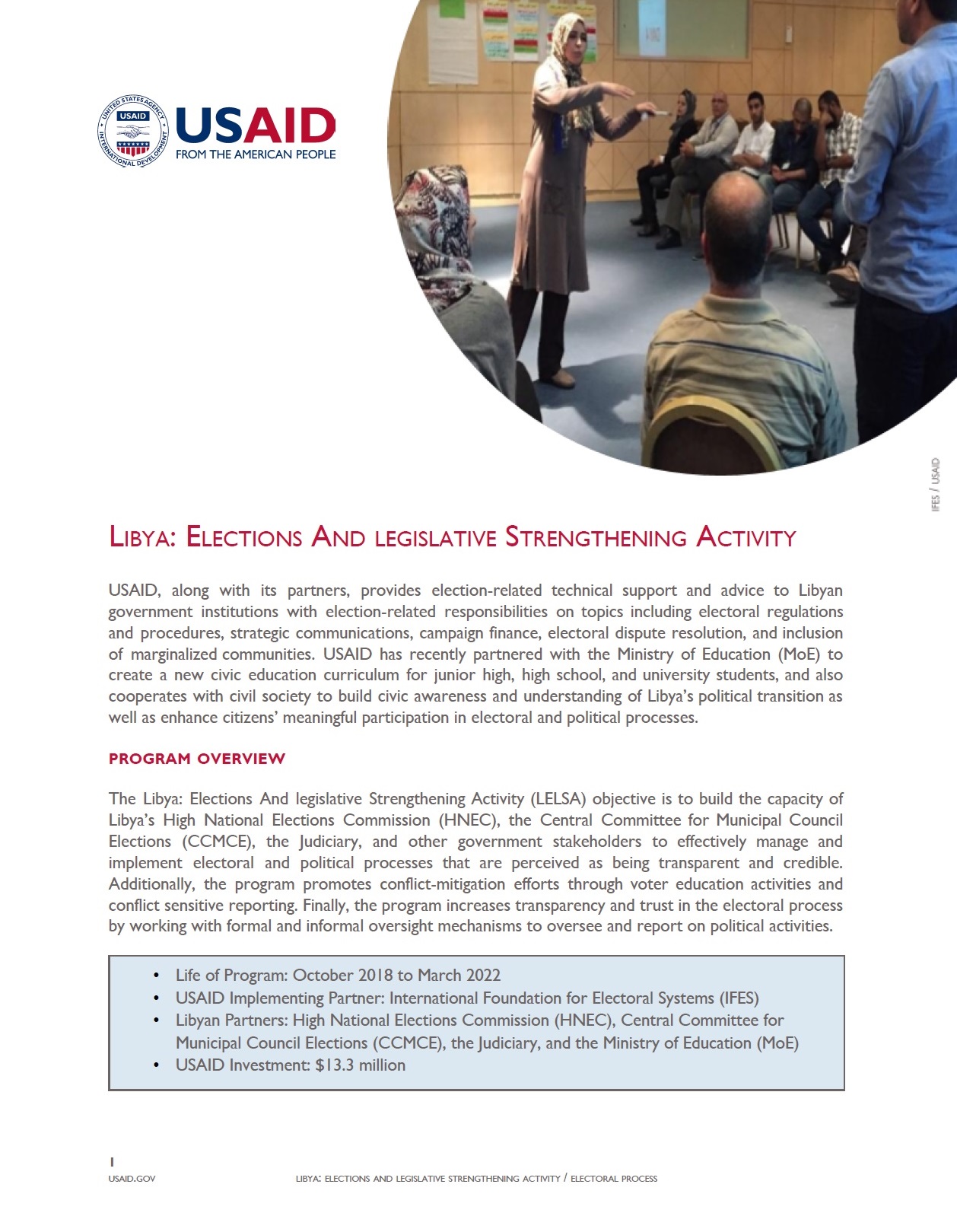Speeches Shim
LIBYA: ELECTIONS AND LEGISLATIVE STRENGTHENING ACTIVITY
USAID, along with its partners, provides election-related technical support and advice to Libyan government institutions with election-related responsibilities on topics including electoral regulations and procedures, strategic communications, campaign finance, electoral dispute resolution, and inclusion of marginalized communities. USAID has recently partnered with the Ministry of Education (MoE) to create a new civic education curriculum for junior high, high school, and university students, and also cooperates with civil society to build civic awareness and understanding of Libya’s political transition as well as enhance citizens’ meaningful participation in electoral and political processes.
PROGRAM OVERVIEW
The Libya: Elections And legislative Strengthening Activity (LELSA) objective is to build the capacity of Libya’s High National Elections Commission (HNEC), the Central Committee for Municipal Council Elections (CCMCE), the Judiciary, and other government stakeholders to effectively manage and implement electoral and political processes that are perceived as being transparent and credible. Additionally, the program promotes conflict-mitigation efforts through voter education activities and conflict sensitive reporting. Finally, the program increases transparency and trust in the electoral process by working with formal and informal oversight mechanisms to oversee and report on political activities.
- Life of Program: October 2018 to March 2022
- USAID Implementing Partner: International Foundation for Electoral Systems (IFES)
- Libyan Partners: High National Elections Commission (HNEC), Central Committee for Municipal Council Elections (CCMCE), the Judiciary, and the Ministry of Education (MoE)
- USAID Investment: $13.3 million
PROGRAM ACTIVITIES
- Provide technical support and advice to the HNEC and the CCMCE – including support for strategic communication and planning, electoral dispute resolution, public outreach, voter registration, capacity development, and development of regulations and procedures.
- Increase public awareness and understanding of processes related to Libya’s political transition by supporting effective and credible official and unofficial outreach by government and civil society actors using traditional and non-traditional media.
- Ensure a unified legislative framework for elections and processes related to the implementation of electoral events and provide technical support and advice to the judiciary on the legal framework for elections and electoral dispute resolution.
- Enhance both governmental and citizen oversight of electoral processes, for example through media and political finance monitoring.
- Increase women’s and marginalized groups’ genuine inclusion and participation in Libyan electoral and civic processes.
- Increase awareness and access to elections for persons with disabilities.
- Support citizen-led efforts to mitigate and reduce instances and threats of electoral violence.
PROGRAM ACHIEVEMENTS
- Supported the production of outreach materials and electoral awareness campaigns for the 2019 municipal council elections.
- Supported the capacity-building and professionalization of CCMCE staff, branch committees, and polling staff and provided operational support to facilitate municipal council elections across Libya. So far, this has included elections in 22 municipalities in 2019.
- Supported HNEC to manage the national voter registration system, and the CCMCE in establishing a new IT infrastructure for the update of voter registration across Libya.
- Supported HNEC in drafting regulations governing implementation of the law on the referendum on the permanent constitution, specifically related to electoral dispute resolution (EDR) and judicial oversight of the referendum.
- Collaborated with HNEC to train women from across Libya to serve as Outreach Ambassadors, who will conduct activities aiming to increase women’s participation in future elections.
- IFES is expanding the official MoE civic education curriculum through grades 10-12, building the future democratic participation of Libya’s youth with crucial civic and voter education. IFES is also supporting the MoE and Libyan universities to develop official civic education curriculum for university students.


Comment
Make a general inquiry or suggest an improvement.